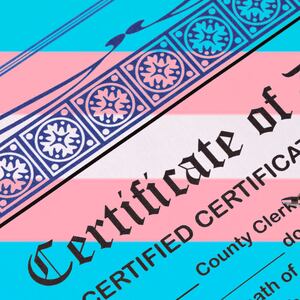When the state of Alabama finally issued Darcy Corbitt a driver’s license that matched her gender identity, the first thing she did was drive to get a milkshake. “I literally drove for two hours,” she tells The Daily Beast. “I got a burger, and I drove around listening to music. It was a very teenager thing to do, but I felt free.”
That feeling of liberation was one to which Corbitt was unaccustomed. Corbitt moved from North Dakota to Alabama in 2017 to pursue her PhD at Auburn University, and soon thereafter, the state’s Department of Motor Vehicles (DMV) refused her a driver’s license with a female gender marker. Officials said she didn’t meet the state’s policy that trans people undergo gender-affirming surgery prior to correcting their license.
When her out-of-state license expired in September 2020, Corbitt could no longer drive, and she didn’t have a valid license for six months. Corbitt, who lives in a rural area outside of Auburn, was forced to move in with her parents and had to rely on family and friends to take her wherever she needed to go. She missed her great-aunt’s funeral because no one was able to drive her. All the while, Corbitt says she kept paying insurance and monthly payments on a car she couldn’t legally operate.
“I felt like I was a prisoner, that I didn’t have freedom anymore,” she says. “I couldn't go where I wanted to go, when I wanted to go. I feel like I was guilty of a crime I didn't commit, like I’m being punished by the state for being who I am.”
Although the U.S. District Court for the Middle District of Alabama ruled in January 2021 that the state’s policy is unconstitutional and ordered the DMV to issue Corbitt a corrected driver’s license, she is still fighting to be free. After Alabama asked the 11th Circuit Court of Appeals to overturn the prior ruling, judges heard oral arguments in the case on Tuesday. The trial marks the first time a U.S. federal appeals court has weighed in on the right of trans people to licenses that correspond with their lived identities.

The ultimate verdict could have a surprising impact on another current trans rights battle in Alabama. A bill that would outlaw doctors and other medical providers from offering gender-affirming care to trans minors under the age of 19 is currently awaiting a hearing in the Alabama House after passing the Senate in February by a 24-6 margin. Known as SB 184 in the Senate and HB 266 in the House, the legislation would make treatments like hormones and puberty blockers a class C felony in Alabama. Medical providers could face up to 10 years in prison and a $15,000 fine.
The conjunction of Alabama’s efforts to limit trans youth health care and prevent trans people from correcting their IDs may have unintended consequences, according to LGBTQ+ advocacy groups. In tandem, these regulations would make it effectively impossible for trans drivers under the age of 19 to get their license.
“Together they’re just such an example of a double bind that trans people so often find ourselves in,” Gabriel Arkles, senior counsel for the Transgender Legal Defense and Edudcation Fund (TLDEF), tells The Daily Beast. “We can’t get an ID that allows us to navigate the world safely unless we get some form of health care. And then we can’t get access to health care because they literally want to make it a felony.”
Under the policies that Alabama is fighting to defend in court, Arkles says there’s a difference between how they are written and how they are actually implemented. Although the DMV only stipulates a requirement that trans drivers receive gender-affirming surgery prior to correcting their licenses, that language is vague and can be inconsistently interpreted. He says the state’s expectation is that “everyone at a minimum has genital surgery” but adds that Alabama officials have stated on several occasions that people may also need “top surgery” to fulfill the requirement.
The way all of that works in practice is that trans applicants are required to provide a letter from a doctor stating that they have “performed complete and irreversible gender reassignment surgery upon this person,” according to Arkles. If the letter does not use that exact language, he says DMV workers will telephone the surgeon’s office and ask: “Well, was this a complete reassignment?”
Those protocols are likely to place a severe burden on trans youth, Arkles says, who will be unable to meet those requirements if Alabama bans gender-affirming medical care for people under 19. Even now, young people typically do not receive any form of gender confirmation surgery until they reach 18 years of age, and it can be a years-long process that includes being placed on numerous waiting lists. There are only three doctors in the entire state that even specialize in trans-affirming care.
Thus, the reality is that trans youth may have to wait until well after they are 19 years old to get a license if Alabama has its way, Arkles says. “It is vanishingly unlikely that someone who had not been able to get access to any form of gender-affirming care—not therapy, not hormones, not anything—would suddenly upon turning 19 be able to get any form of surgery, much less genital surgery,” he says.
While trans people are legally allowed to drive in Alabama with an uncorrected license, it can be extremely dangerous to do so. A 2015 survey from the National Center for Transgender Equality (NCTE) found that 32 percent of trans people who had presented an ID that didn’t match their lived gender had been harassed or attacked.

Destiny Clark has experienced firsthand how difficult it can be to get an amended driver’s license as a trans person in Alabama. When she first went to the DMV in April 2015, she brought with her a court order attesting to her legal name change and a surgeon’s letter. She says a DMV representative told her that the procedures she had already undergone were “not enough” and that additional operations would be required before her gender marker correction would be approved.
Clark, a health care worker for people living with HIV, went 10 years without a corrected license. She says that not having access to an ID that matched her gender identity kept her from going anywhere that she would need to be carded, in fear of harassment or violence. She only went to places, she says, where she knew that she was safe.
“It was a lot of work,” she tells The Daily Beast. “If it was to go to the store to buy drinks, my boyfriend would always go. I would only go to a restaurant where I knew the server. It was stressful because I know who I am, and I know that I’m a female. But I knew if I showed my driver’s license to the wrong person, it could get me injured or murdered. That was always in the back of my mind.”
Clark says it’s “really sad” to know that countless trans youth across Alabama could be subjected to the same mistreatment she was, but it also motivates her to keep lobbying to overturn the state’s policies. Along with Corbitt and a third anonymous defendant, she is a co-plaintiff in the TLDEF lawsuit currently being heard by the 11th Circuit. The plaintiffs are also being represented in the case by the American Civil Liberties Union (ACLU) and the ACLU of Alabama.
After being denied a corrected driver’s license two more times, Clark says she cried “tears of joy” in January 2021 when the lower court ruling paved the way to finally get the ID she had long sought. After being forced to wait for an hour in a courthouse basement, she was finally handed a license that said “Destiny Clark, female,” along with a letter from the state saying it intended to keep fighting the decision in court.
That moment was “bittersweet,” Clark recalls. “The state of Alabama wanted to be sure that I had a letter that said they feel like they are going to win the case and they will revoke my driver’s license, but all at my cost,” she says. “So it was a joyous day, but it was like, ‘You’re not going to stop. You’re going to drag this out.’”
Trans people in Alabama say they have no idea what’s coming next. A House vote on Alabama’s proposed trans youth medical care ban is expected in the coming weeks, but the 11th Circuit isn’t likely to weigh in on driver’s license corrections for at least another six months, according to TLDEF. Alabama is also weighing the passage of legislation that would prohibit trans students in K-12 schools from using the restroom or locker room that matches their gender identity.
Alabama Gov. Kay Ivey is expected to sign the anti-trans health care bill if it reaches her desk. While it would make Alabama just the third U.S. state to limit gender-affirming medical care after Arkansas and Tennessee, the legislation would also force teachers and other school staff to out trans students to their parents. The bill bars educators from withholding information regarding a student’s gender identity from their families.
But in the face of these attacks on trans youth, Corbitt says that seeing the lives that would be impacted “strengthens my resolve to be as big a pest as possible to the state of Alabama, to dig in and not let them not let them win.”
“I’m really very thankful every opportunity we have to go to court to make the state of Alabama go on the record, stating how much they hate transgender people,” she says. “All these outrageous bills that they have going right now that would criminalize being transgender are just additional evidence to that fact. It seems that they would rather people kill themselves than mind their own business.”







